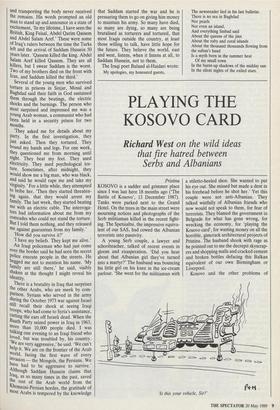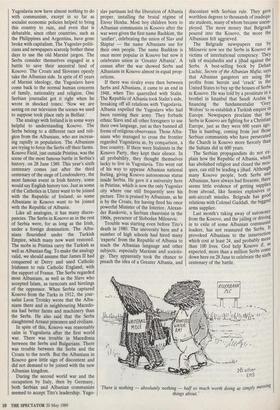PLAYING THE KOSOVO CARD
Richard West on the wild ideas
that fire hatred between Serbs and Albanians
Pristina KOSOVO is a sadder and grimmer place since I was last here 18 months ago (`The Battle of Kosovo', 13 December 1987). Tanks were parked next to the Grand Hotel. On the trees in the main street were mourning notices and photographs of the Serb militiaman killed in the recent fight- ing. The Spetsialtsi, the impressive equiva- lent of our SAS, had cowed the Albanian terrorists into passivity.
A young Serb couple, a lawyer and schoolteacher, talked of recent events in gloom and exasperation. `Did you hear about that Albanian girl they've turned into a martyr?' The husband was bouncing his little girl on his knee in the ice-cream parlour. 'She went for the militiaman with a stiletto-heeled shoe. She wanted to put his eye out. She missed but made a dent in his forehead before he shot her.' Yet this couple were not anti-Albanian. They talked wistfully of Albanian friends who now would not speak to them, for fear of terrorists. They blamed the government in Belgrade for what has gone wrong, for wrecking the economy, for 'playing the Kosovo card', for wasting money on all the horrible, gimcrack architectural projects of Pristina. The husband shook with rage as he pointed out to me the decrepit skyscrap- ers and shopping malls and cracked cement and broken bottles defacing this Balkan equivalent of our own Birmingham or Liverpool.
Kosovo and the other problems of 'Is this your vehicle, Sir?' Yugoslavia now have almost nothing to do with communism, except in so far as socialist economic policies helped to bring this country to ruin, and even that is debatable, since other countries, such as the Philippines and Argentina, have gone broke with capitalism. The Yugoslav politi- cians and newspapers scared), bother these days to use the old Marxist jargon. The Serbs consider themselves engaged in a battle to save their ancestral land of Kosovo. The Croats and Slovenes openly take the Albanian side. In spite of 45 years of Marxist ideology, the Yugoslays have come back to the normal human concerns of family, nationality and religion. One Serbian journalist got it right when he wrote in shocked tones: 'Now we are seeing on our television the scenes we used to suppose took place only in Belfast.'
The analogy with Ireland is in some ways helpful to understanding Kosovo. The Serbs belong to a different race and reli- gion from the Albanians, who are increas- ing rapidly in population. The Albanians are trying to force the Serbs off their farms. Kosovo Field, just outside Pristina, was the scene of the most famous battle in Serbia's history, on 28 June 1389. This year's sixth centenary comes just after the third centenary of the siege of Londonderry, the most famous event in Irish history, some would say English history too. Just as some of the Catholics in Ulster want to be joined with the Republic of Ireland, so some Albanians in Kosovo want to be joined with the Republic of Albania.
Like all analogies, it has many discre- pancies. The Serbs in Kosovo as in the rest of Serbia were, for as long as the Irish, under a foreign domination. The Alba- nians flourished under the Turkish Empire, which many now want restored. The mobs in Pristina carry the Turkish as well as Albanian flag. To make the analogy valid, we should assume that James II had conquered at Derry and used Catholic Irishmen to rule Catholic England, with the support of France. The Serbs regarded most Albanians, as well as the Slays who accepted Islam, as turncoats and hirelings of the oppressor. When Serbia captured Kosovo from the Turks in 1912, the jour- nalist Leon Trotsky wrote that the Alba- nians there and in neighbouring Macedo- nia had better farms and machinery than the Serbs. He also said that the Serbs slaughtered Amaut prisoners and civilians.
In spite of this, Kosovo was reasonably calm in Yugoslavia after the first world war. There was trouble in Macedonia between the Serbs and Bulgarians. There was trouble between the Serbs and the Croats to the north. But the Albanians in Kosovo gave little sign of discontent and did not demand to be joined with the new Albanian kingdom.
During the second world war and the occupation by Italy, then by Germany, both Serbian and Albanian communists seemed to accept Tito's leadership. Yugo-
slay partisans led the liberation of Albania proper, installing the brutal regime of Enver Hoxha. Most boy children born to Albanian communists in Kosovo after the war were given the first name Bashkim, the 'unifier', celebrating the union of Slav and Shiptar — the name Albanians use for their own people. The name Bashkim is once more popular in Kosovo but now it celebrates union in 'Greater Albania'. A census after the war showed Serbs and Albanians in Kosovo almost in equal prop- ortions.
If there was rivalry even then between Serbs and Albanians, it came to an end in 1948, when Tito quarrelled with Stalin. The Republic of Albania took Stalin's side, breaking off all relations with Yugoslavia. Albania expelled the Yugoslays who had been running their army. They forbade ethnic Slays and all other foreigners to use their own language, just as they banned all forms of religious observance. Those Alba- nians who managed to cross the frontier regarded Yugoslavia as, by comparison, a free country. If there were Stalinists in the Kosovo Party, they kept their silence. In all probability, they thought themselves lucky to live in Yugoslavia. Tito went out of his way to appease Albanian national feeling, giving Kosovo autonomous status inside Serbia. He gave it a university here in Pristina, which is now the only Yugoslav city where one still frequently sees his picture. Tito is praised by Albanians, as he is by the Croats, for having fired his once powerful Minister of the Interior, Alexan- der Rankovic, a Serbian chauvinist in the 1960s, precursor of Slobodan Milosevic.
Trouble was starting even before Tito's death in 1980. The university here and a number of high schools had hired many 'experts' from the Republic of Albania to teach the Albanian language and other subjects, especially Marxism and sociolo- gy. They apparently took the chance to preach the idea of a Greater Albania, and
discontent with Serbian rule. They gave worthless degrees to thousands of inadequ- ate students, many of whom became unem- ployed. The more money that Belgrade poured into the Kosovo, the more the Albanians felt aggrieved. The Belgrade newspapers run by Milosevic now see the Serbs in Kosovo as victims of interhational conspiracy. They talk of mujahedin and a jihad against the Serbs. A best-selling book by Dehan Luchic, Secrets of the Albanian Mafia; says that Albanian gangsters are using the profits from heroin and 'crack' in the United States to buy up the houses of Serbs in Kosovo. He was told by a prostitute in a brothel in Istanbul that Saudi Arabia is financing the fundamentalist 'Grey Wolves' to re-establish a Turkish empire in Europe. Newspapers proclaim that the Serbs in Kosovo are fighting for a Christian Europe, just as they were 600 years ago. This is humbug, coming from just those Serbian communists who have persecuted the Church in Kosovo more fiercely than the Sultans did in 600 years.
The Serbian propagandists do not ex- plain how the Republic of Albania, which has abolished religion and closed the mos- ques, can still be leading a jihad. Although many Kosovo people, both Serbs and Albanians, have always had firearms, there seems little evidence of getting supplies from abroad, like Semtex explosives or anti-aircraft missiles. Belgrade has good relations with Colonel Gaddafi, the biggest arms supplier. Last month's taking away of autonomy from the Kosovo, and the jailing or driving in to exile of some Albanian communist leaders, has not reassured the Serbs. It provoked Albanians to the insurrection which cost at least 24, and probably
more i than 100 lives. God help Kosovo f, as expected, more than a million Serbs come down here on 28 June to celebrate the sixth centenary of the battle. munist 'There is nothing — absolutely nothing — half so much worth doing as simply messing things about.'



































































 Previous page
Previous page